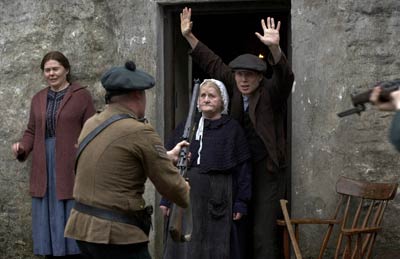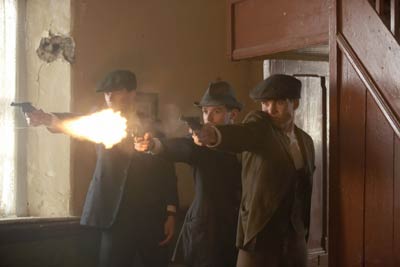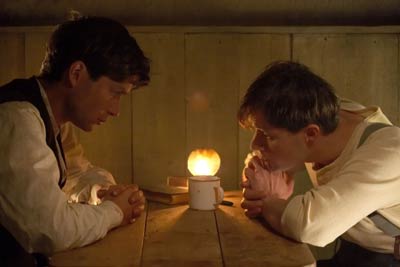The Wind That Shakes The Barley
Grim, but incredibly worthy, thought-provoking look at 1920's Irish nationalism.

Looking around at the current state of Britain, you aren't immediately struck by the notion that as little as one hundred years ago we essentially ruled the world, with the largest Empire since the Romans went back to Rome to do as they usually did. Still, rule they did, although after the draining horror of the First World War the writing started rapidly going up on the wall for Imperial control as close to home as Ireland.
With an electoral mandate, Sein Fein declares a Republic of Ireland, with Britain swiftly dispatching the "Black and Tan" volunteer army to put this troublesome Irish Republican Army in their place. Cue an attempt to win the hearts and minds of the Irish through a soft and fluffy campaign of beatings, humiliations and casual racism that the Army of the time was famed for. Unsurprisingly this meets with little success, prompting two small town brothers Damien (Cillian Murphy) and Teddy (Padraic Delaney) to take up arms against their oppressors, the recently qualified Doctor Damien rather more reluctantly than Teddy.
The armed struggle, rather like Napoleon, was comparatively short and brutish. After a meeting between Sinn Fein and the Lloyd George government during which it was made clear that Britain could not cede the entirety of Ireland in case it gave the colonies ideas, the threat of immediate and terrible war leaves parties with the best compromise of splitting Ireland into two. While much of the IRA accept the Free Republic as the best solution they could have achieved from this mess and get on with becoming the new power structure, a percentage decide that there's not enough Freedom in the Republic, still essentially having to kowtow to the British crown. On the acceptance side sits Teddy, on the continue fighting side sits Damien, causing the obvious tensions when it devolves into Irishmen killing Irishmen over differing ideals.

As history tells us, there's no happy ending here, the wounds inflicted here lingering and causing new hurts eighty years on. It's a testament to the famed British reserve and understatement that the lamentable divides, sectarianism, conflicts and murders that come of direct consequence of these few years are called "The Troubles"; a name so ill-fitting that we might as well have called the Second World War "The Skirmish". While it's difficult to defend armed uprisings, either then or now, it's difficult not to have some sympathy with the root cause of all of this, and teaches us not to stick people into little boxes saying 'terrorist' without first considering why they think the label reads 'freedom fighter'.
All of which might sound familiar, and not just in relation to Irish politics. It's not difficult to relate all of this to the storms besieging Iraq at the moment, and not difficult to wonder if we aren't making precisely the same mistakes that will have precisely the same repercussions. I've no idea if this was Loach and scriptwriter Paul Laverty (also responsible for the superb Sweet Sixteen and My Name is Joe) were intending to convey, but it's certainly what I was thinking about on the drive home.
Which might be construed as disrespectful to what is, grander political implications aside, a fine film indeed. Cillian Murphy adds another fine performance to a string of them over the past few years, proving himself to be one of the most versatile actors treading the boards at the minute. Equally at ease with such oddball outings as Breakfast on Pluto and mainstream, near B-movie thriller fare as Red Eye, this believable and heartfelt turn will do his credibility no harm whatsoever. The supporting cast prove equally adept, with Loach balancing out what can at times purely of narrative necessity be somewhat heavy handed, brutal drama with very occasional moments of levity that never stray into patronising territory. The only thing taking some of the shine from it is the one-sidedness of the British characters, who with one exception are the sort of brutish bully that belong more to comic strips than reality. That said, Empires aren't built by being pleasant, and there's a goodly amount of nasty Colonial history that we do our best to ignore these days for precisely this sort of reason.

You're not going to be able to make a film about the IRA in any timeframe without stirring up a hornet's nest, but while I'm not about to hold this up as a documentary it does manage to tie what seems to be the accepted way this sorry chapter of British history unfolded into a compelling human drama, which is no mean feat. What it doesn't do, purely by dint of the subject matter rather than lax effort, is provide enjoyable and comfortable viewing. It's not easy to make it all of the way through The Wind That Shakes The Barley without shifting somewhat uncomfortably in your seat at points, regardless of your position in the political spectrum, and not easy to stop thinking about the themes it raises for many days afterwards. This, of course, is no criticism of the film, instead as high a praise as I can bestow on it.
Were I in the business of passing quantifiable judgements, I'd award this 4/5 TippyMarks.
Padraic Delaney (Teddy)
Roger Allam (Sir John Hamilton)
Liam Cunningham (Dan)
Gerard Kearney (Donnacha)
William Ruane (Gogan)
Orla Fitzgerald (Sinead)